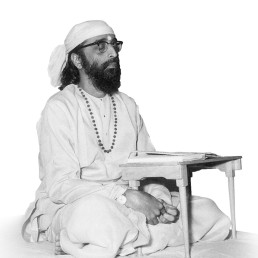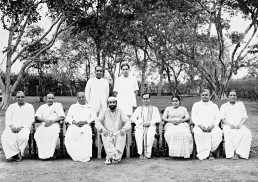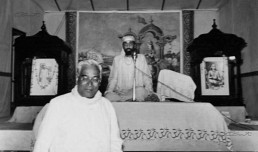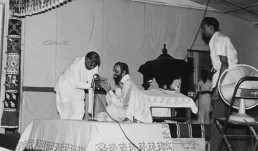
Jnana Yajna 42

Year & Dates:
May 26, 1958 to June 15, 1958

Yajna Topic:
Shrimad Bhagavad Gita- Chapter 3

Place:
Kolar, India.
Kolar, a small town that rose to fame because of its gold mines, waited eagerly for Pujya Gurudev to arrive. The people had already been informed that He had left Bengaluru, which was about 100 km (around 62 miles). The 41st Jnana Yajna in Jayanagar had been successfully concluded only that morning of May 26, 1958. And, Pujya Gurudev was going to begin His 42nd Jnana Yajna that same evening in Kolar. More precious than gold was time to Pujya Gurudev. The hard-working community of Kolar was going to receive the glorious knowledge about worshipful work from a tireless Master. Bhagavan Krishna’s immortal advice in chapter 3 about how work purifies and elevates was the focus of Pujya Gurudev’s Gita Jnana Yajna.
Precious Time for Valuable Work
The Gita Jnana Yajna spotlighting Chapter 3, Karma Yoga, was inaugurated at Kolar Gold Fields (KGF) by Shri Nijalingappa who was then the Ex-Chief Minister of Mysuru (Karnataka). The Managing Director of the Gold Mine Undertakings, Sri Muninanjappa, who was also the president of the Gita Jnana Yajna Committee, welcomed Pujya Gurudev and the audience. After those preliminary speeches, Pujya Gurudev introduced the format and features of the Gita Yajna.
The venue for the 42nd yajna was an unusual one. It was a large tin-roofed hall, referred to as the town’s ‘skating rink,’ and its walls were made of corrugated sheets. Echoes during discourses were a problem, and when the monsoon rains pelted the roof and the metal sides of the building, it became a painful challenge for both Pujya Gurudev and the seekers. Nevertheless, Pujya Gurudev roared the message of the Gita as always. When He spoke about how to achieve perfection through selfless work, His words and attitude to the external hurdles were a shining example of His consummate level of work. The verse, “Whatever a great man does, that others also do (imitate). Whatever He sets up as the standard, that the world follows,” came to life as the audience listened with deep regard.
On June 11th, Pujya Gurudev completed the Jnana Yajna, four days ahead of schedule. Though His health had taken a beating, He persisted with the ceremonies of the Ganga Prokshana (sprinkling) and Guru Dakshina after the Akhanda Kirtan. Only after the Yajna was rightly concluded, did He leave to Bengaluru to rest briefly and recuperate. From the start to finish, He exemplified perfection in work, true to what He taught.
Photo Gallery

“Think,” Says Pujya Gurudev
Man is essentially an imitating animal. This is a psychological truth. The moral rejuvenation of a society in any period of history can take place only because of the example set forth by the leaders of that nation. Students can be disciplined only when teachers are well behaved; kindness and honestly cannot be corrupt tyrants. Childrens’ behavior depends entirely upon, and is ever controlled by, the standard of purity and culture in their parents.
With this Krishna raises his next argument why Arjuna should act in the world. Unless he diligently acts, the chances are that the entire community will follow the low standard of retreat from actions set up by him and thus they will ultimately invite a general decadence of the Hindu culture in life.
From Tyagi Magazine
Here Krishna says that a man of Self-realization also works in the world with as much diligence and sincerity, tireless enthusiasm and enervating joy, burning hopes and scalding energy, as any ordinary man striving in the competitions of the market-place. The only difference between the two is that, while the ignorant act anxieties for the fruits,” a man of Godly intentions or complete Perfections will work in the world, without attachment, only for the purpose of the redemption of the world.
From Tyagi Magazine
Only 1% Are Able to Do This!
In this powerful video Swami Chinmayananda sheds light on why only a select few attain greatness and pivotal role of surrendering to the Divine. Uncover how surrendering unleashes unparalleled vitality, knowledge, and success. Learn why third-rate work cannot bring forth excellence and how lack of adjustment and cohesiveness hinders success.


